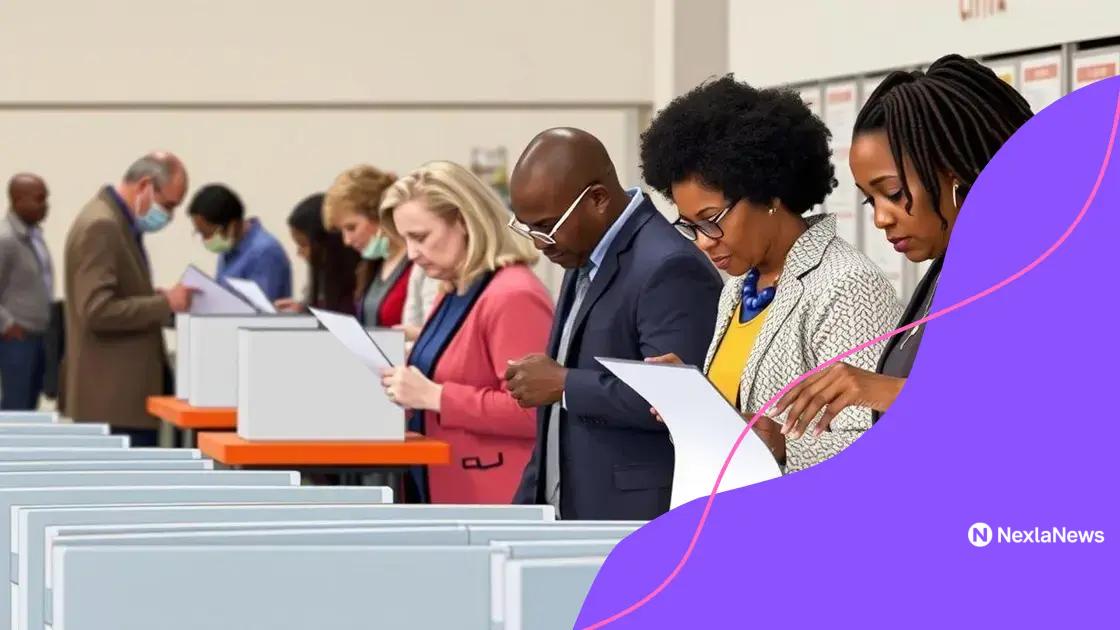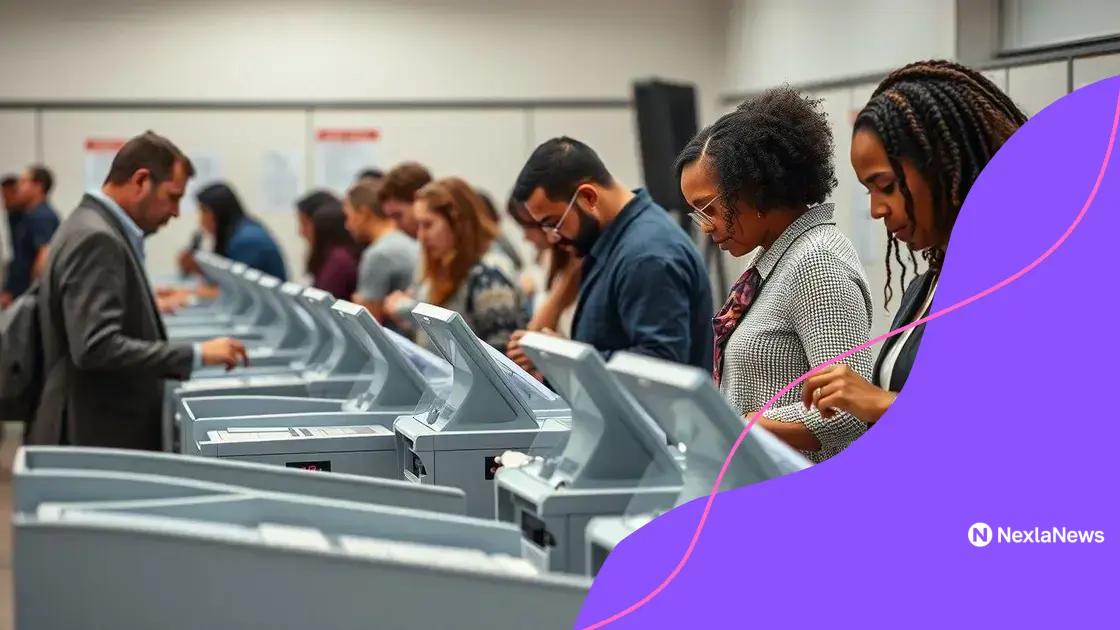Election integrity: ensuring a fair democratic process

Election integrity ensures that elections are conducted fairly and transparently, protecting the democratic process through citizen involvement, technological advancements, and adherence to international standards.
Election integrity is crucial for maintaining public trust in democratic systems. Have you ever wondered how fair the electoral process truly is? Join us as we delve into safeguarding democracy through integrity.
Understanding election integrity
Understanding election integrity is essential for fostering trust in democratic processes. It involves ensuring that elections are conducted fairly, transparently, and in accordance with established laws. Voters must feel confident that their votes will count and the outcome reflects their will.
Key Components of Election Integrity
Several components contribute to maintaining election integrity. These include:
- Transparent voting processes
- Secure voter registration systems
- Accurate ballots and counting procedures
- Robust mechanisms for addressing disputes
When these elements are in place, citizens can engage in the electoral process with peace of mind. Continuous monitoring and evaluation are critical for identifying potential risks to election integrity. This requires collaboration among government officials, election monitors, and civil society.
Importance of Voter Education
Another significant aspect of election integrity is voter education. Well-informed voters are less susceptible to misinformation, which can undermine trust in the electoral process. Providing accurate information about voting procedures and rights ensures that voters can effectively exercise their choices.
Moreover, education fosters civic engagement. Voters are more inclined to participate when they understand the importance of their input in shaping policies and decisions that affect their lives.
By working towards a collectively informed electorate, we can prevent manipulation and reinforce the foundations of a healthy democracy.
The Role of Technology
Technology has a dual role in enhancing election integrity. On one hand, it can streamline voting processes and improve access to information. On the other hand, it poses new challenges, such as cybersecurity threats. Ensuring that technology is used responsibly is pivotal for maintaining public confidence.
Investments in secure systems and training for election officials are vital steps in safeguarding elections against potential disruptions. As we navigate these advancements, vigilance is necessary to uphold the principles of election integrity.
Ultimately, understanding and promoting election integrity is a shared responsibility. By prioritizing transparent practices and fostering informed citizens, we contribute to a resilient democratic process that honors the will of the people.
Historical challenges to election integrity
Throughout history, election integrity has faced significant challenges. These obstacles not only affect public trust but also the overall health of democratic processes. By examining past issues, we can better understand how to safeguard future elections.
Examples of Historical Challenges
Several key events illustrate the struggles for election integrity:
- The disenfranchisement of minority voters
- Voter intimidation tactics
- Manipulation of election laws
- Corruption in the vote counting process
Each of these moments reflects attempts to undermine the democratic system. For example, disenfranchisement has historically targeted specific groups, making it harder for them to participate in elections. This has led to unequal representation in government.
Impact of Misinformation
In the digital age, misinformation poses a new threat to election integrity. False narratives can spread rapidly, influencing public perception and potentially swaying voter behavior. Social media platforms have become a breeding ground for misleading information.
To counter this, it is vital to promote media literacy among voters. When individuals can critically assess information, they are less likely to fall prey to myths and untruths that can distort electoral outcomes. Awareness campaigns and fact-checking resources play a crucial role in this effort.
Furthermore, historical challenges remind us that the fight for election integrity is ongoing. Lessons learned from the past highlight the need for vigilance and active participation from all citizens. By remaining informed and engaged, we can help ensure that every vote counts.
The role of technology in elections

The role of technology in elections has transformed how we vote and participate in the democratic process. It has enhanced access to information and streamlined many voting procedures. However, with innovation comes both opportunities and challenges.
Benefits of Technology in Elections
Technology brings numerous benefits to the electoral process. Some key advantages include:
- Increased accessibility for all voters
- Efficiency in counting votes
- Enhanced security measures
- Improvements in voter registration processes
For instance, online voter registration has made it easier for people to sign up and ensure their participation. Moreover, electronic voting machines can reduce the chances of human error during the counting process.
Challenges of Implementing Technology
Despite its benefits, the use of technology in elections also poses significant challenges. Cybersecurity threats are a primary concern. Malicious actors may attempt to manipulate results or disrupt voting processes. Addressing these threats is crucial to maintaining election integrity.
Additionally, there is the issue of digital divides. Not everyone has equal access to the internet or tech devices, potentially disenfranchising certain groups of voters. Ensuring equitable access to technology solutions is vital for fair elections.
In light of these challenges, ongoing training for election officials and regular updates to technological systems are necessary. Public awareness about the security of electronic voting can also help boost trust among voters.
In conclusion, the integration of technology in elections is a double-edged sword. While offering great potential for improvement, it requires careful consideration and robust safeguards to ensure that democracy is upheld.
How citizens can promote election integrity
Citizens play a vital role in promoting election integrity. Their active participation and engagement are essential for fostering a fair electoral process. By understanding their rights and responsibilities, individuals can contribute to a stronger democracy.
Ways to Promote Election Integrity
Here are several ways citizens can help:
- Educate themselves and others about voting rights
- Report any instances of voter intimidation
- Volunteer as poll workers during elections
- Engage in civic discussions and share accurate information
Education is a powerful tool. When citizens know their voting rights, they are less vulnerable to misinformation and manipulation. Educating friends and family can create a community that values and understands the importance of election integrity.
Engaging with Local Communities
Community engagement is crucial for fostering a transparent electoral environment. Citizens should participate in local town halls and electoral meetings. This involvement can help raise awareness about issues affecting elections in their area.
Moreover, collaborating with local organizations can amplify efforts to defend election integrity. Many groups focus on monitoring elections and ensuring fair practices. Joining these organizations allows citizens to contribute actively and stay informed.
Social media can also be used effectively. By sharing verified information and encouraging others to vote, citizens can help combat misinformation while promoting a culture of openness and trust in the electoral process.
Global perspectives on election integrity
Global perspectives on election integrity reveal how different nations approach the electoral process. Each country has unique challenges and successes that contribute to how they protect democracy. Understanding these perspectives can offer valuable insights.
Variations in Electoral Systems
Countries around the world utilize various electoral systems. These systems determine how votes are cast and counted. Some common types include:
- First-past-the-post
- Proportional representation
- Ranked choice voting
- Mixed electoral systems
Each system has its pros and cons regarding election integrity. For instance, proportional representation can lead to greater representation of diverse viewpoints, while first-past-the-post may simplify the voting process.
International Standards and Agreements
International bodies, like the United Nations, set standards for fair elections. These guidelines help countries improve election integrity by promoting free and fair practices. Adherence to these standards ensures that elections are conducted transparently and equitably.
Many countries participate in election observation missions. These missions help monitor elections and provide recommendations to enhance practices. They foster international cooperation and support in strengthening electoral systems.
Learning from global experiences allows countries to identify effective strategies to improve their democratic processes. Collaboration among nations can lead to shared best practices that promote better governance.
Challenges still exist. Some nations face issues like voter suppression, corruption, and authoritarian practices that undermine election integrity. Addressing these challenges requires commitment from both leaders and citizens to uphold democratic values.
In summary, election integrity is crucial for a healthy democracy. Citizens, technology, and global perspectives all play significant roles in reinforcing this principle. By staying informed and actively participating, we can ensure fair elections that truly reflect the will of the people. Protecting election integrity promotes trust and strengthens our democratic foundations. Together, we can work towards a more transparent and equitable electoral process that benefits everyone.
FAQ – Frequently Asked Questions about Election Integrity
What is election integrity?
Election integrity refers to the assurance that elections are conducted fairly, transparently, and in accordance with the law, ensuring that every vote counts.
How can citizens promote election integrity?
Citizens can promote election integrity by educating themselves and others about voting rights, volunteering as poll workers, and reporting any forms of voter intimidation.
What role does technology play in elections?
Technology enhances election processes by improving access to information, streamlining voting and counting methods, but it also introduces challenges such as cybersecurity threats.
Why is global cooperation important for election integrity?
Global cooperation allows countries to share best practices, adhere to international standards, and strengthen the overall electoral process, ensuring fair elections worldwide.
